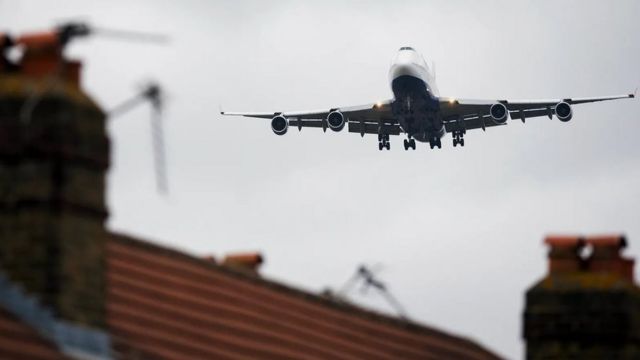
[ad_1]
- Cyberris hansen
- BBC
In 2011, Frankfurt Airport, Germany’s busiest airport, unveiled its fourth runway. But this new addition quickly sparked widespread protests, and protesters continued to return to the airport to demonstrate on Mondays every week for several years. One of them told Reuters: “This runway destroys my life. Every time I walk into my garden, I don’t hear or see anything other than planes flying over my house.”
Thanks to this new runway, the planes fly directly over the house of Thomas Munzel, cardiologist at the medical center of the University of Mainz. “I’ve lived near highways and internal railroads,” says Munzel, “but aircraft noise is by far the most annoying.”
Munzel read the 2009 WHO report linking noise to heart disease, but evidence was scarce at the time. Concerned about his personal health, he decided in 2011 to conduct research to explore the relationship between heart disease and noise.
Noise exposure has been associated with hearing loss for many years, but noise from airplanes and cars doesn’t just damage the ear, as a study published in the European Heart Journal classified traffic noise as as the second greatest stressor causing physiological changes, just after air pollution. . The researchers said that the effect of noise on health is roughly equivalent to the effect of secondhand smoke or exposure to radon.
Numerous studies over the past decade have linked aircraft, transportation and road noise to an increased risk of cardiovascular disease. Scientists set out to uncover the factors behind this relationship between heart disease and noise.
Cities are notoriously noisy, but the effect of noise may overlap with the effects of other sources of pollution on health
It is estimated that about a third of the European and American population are regularly exposed to unhealthy noise levels, typically starting at around 70 or 80 decibels. To clarify the level of intensity of this sound compared to other sounds, ordinary conversations are usually reached 60 decibels, while cars and trucks have an intensity of between about 70 and 90 decibels, and the sound of sirens is loud. warning and aircraft can reach 120 decibels or more.
Many studies have linked constant exposure to ambient noise to an increased risk of developing heart problems. A 2018 study that looked at health data from more than one million people found that residents living near Frankfurt Airport were seven percent more likely to have a stroke than their counterparts who live in quieter neighborhoods.
An analysis of around 25,000 deaths from cardiovascular disease between 2000 and 2015 among the population living near Zurich Airport in Switzerland indicated that there was a marked increase in deaths from heart disease overnight, especially in women. After exposure to aircraft noise.
When the researchers looked at the physiological factors behind the effect of noise on the heart and blood vessels, they pointed to big changes in the endothelium, the lining of arteries and blood vessels. This liner can be irritated and inflamed and lead to serious consequences.
They interpreted the effect of noise on blood vessels by saying that when sound reaches the brain, two important regions of the brain are activated. The auditory cortex, which interprets noise, and the amygdala, which controls emotional responses to noise. And if the noise goes up, especially during sleep, the amygdala causes a confrontation or an escape reaction, which makes the body alert, even though the person themselves is not feeling anything.
The expansion of the airport sparked protests in many parts of Europe, in which residents reported that the noise was affecting their health.
This stress response releases hormones like adrenaline and cortisol in the body. Then some arteries constrict, others dilate, blood pressure rises, digestion slows down, and sugars and fats flow into the bloodstream for the muscles to use quickly.
The body’s stress response also stimulates the production of harmful molecules that cause oxidative stress – which means an imbalance in the body between free radicals and antioxidants – and inflammation of the lining of blood vessels. This defect in the function of the endothelium of blood vessels can affect blood circulation and have other consequences on many processes in the body. Stopping them or decreasing their effectiveness can lead to many diseases, such as high blood pressure, the build-up of fatty deposits or plaque on the walls of the arteries, obesity and diabetes.
And studies in humans and mice have shown that exposure to aircraft noise at night for a few days results in impaired function of cells that line blood vessels in healthy people, indicating that noise does not adversely affect people exposed to heart and metabolic diseases. troubles alone.
A study by Munzel and a team of researchers in 2019 indicated that exposure to train noise recorded during sleep immediately affected endothelial function in healthy adults.
Munzel says: “We were surprised by the dysfunction of the endothelium of the blood vessels in young people after exposure to these sounds overnight, because we believed that these changes in the endothelium of the blood vessels occurred over the years. . “
However, deciphering the entanglement between cause and effect is not easy, as it is not easy to conduct experiments during long-term sleep or to distinguish between the effects of noise on sleep during sleep. day and its effects on sleep at night. or the effects of noise independent of other pollutants such as air pollution. Which is associated with air pollution, noise pollution or noise pollution.
Andrea Zerekis, a health services specialist at Kings College London, notes that the impact of environmental noise varies from person to person. Zerekis studied the effect of ringing the telephone or the sounds of rubbing the dishes on patients in intensive care rooms, and noted that while these sounds reassured some, they hindered the recovery of others. “We try to distinguish between loudness levels and the patient’s response to noise,” Zerekis explains.
Exposure to high noise levels at night can increase stress levels and lead to changes in endothelial function
However, despite these unanswered questions, more and more studies confirm the link between ambient noise and poor physical health. A World Health Organization report released in 2018 found that traffic noise in Western European countries reduced the number of healthy years their populations are expected to live by more than 1.6 million. years. To reach this conclusion, the organization took into account the number of premature deaths due to noise exposure and the number of years people with disabilities or illnesses lived after exposure to noise.
This number is expected to continue to rise, as the United Nations estimates that 70% of the population will live in cities by 2050.
Some governments have responded to protests and sought solutions to curb noise on city streets, such as banning night flights, motivating people to use noise-free devices, and taxing fines for noise complaints.
People can also make adjustments to protect themselves from the negative effects of noise, such as installing soundproof windows, hanging noise curtains, or moving to quieter neighborhoods, if they can.
Mathias Basner, psychiatrist and epidemiologist at the University of Pennsylvania and chairman of the State Committee on the Biological Effects of Noise, suggests less expensive solutions, like putting on earplugs at night or transforming the quieter part of the room. house in bedrooms. He believes that these measures should be taken by everyone, even if they are not disturbed by the noise.
“If you live in Manhattan, you will familiarize yourself with the noise after a while until you feel it normal, but getting used to the noise doesn’t necessarily mean it doesn’t negatively affect your health,” he says. he.
Source link
